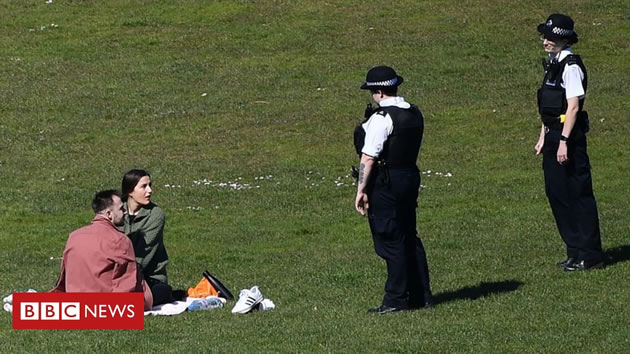Local Police District Had Most Fines for Lockdown Breaches
Claim made that ethnic minorities being disproportionately targeted

July 1, 2020
It is “deeply concerning” that residents living in Ealing, Hillingdon and Hounslow were handed the most fines for breaching lockdown, a West London equality charity has warned. The three boroughs make up the West Area Basic Command Unit area for the police.
According to data revealed by the Met Police, west Londoners made up 17 per cent (165 fines) of the total 973 Covid-19 fixed penalty notices (FPNs) issued across the capital, from March 27, to May 14.
Barking and Dagenham, Havering and Redbridge were the second most fined areas with 125 FPNs issued, followed by Hackney and Tower Hamlets with 101.
Director of the West London Equality Centre, Barbara Karayi, hit out at the police action against one of the capital’s “most diverse areas and high in levels of destitution”.
The Met’s assistant commissioner, Mark Simmons, explained the number of fines varied from area to area across London, adding: “We have seen a general correlation against the locations which were priority areas for policing, such as high violence areas.
“It is of note that during this period we have undertaken significant proactive policing activity targeting violence, drugs, robbery, domestic abuse, speeding and other offences to keep communities safe.”
But the Met Police also admitted that black and Asian people were disproportionately handed fines compared to their make-up of London’s population.
Despite black people totalling just 12 per cent of the capital’s residents according to the Met Police, they made up 26 per cent of the Covid-19 related fines issued over lockdown.
Asian residents make up 18 per cent of the population, but comprised 22.6 per cent of the fines, while white residents, accounting for 59 per cent of the population, were recorded as receiving just 45.6 per cent of the fines.
Explaining the differences, the Met’s analysis said: “The reasons for this are likely to be complex and reflect a range of factors. This includes interactions between the areas subject to significant proactive policing activity targeting crime hot-spots and both the variation in the age-profile and geographical distribution of ethnic groups in London.”
In a Hounslow cabinet meeting earlier this month, communities boss Katherine Dunne said the borough’s ethnic minority population is now expected to be at 67 per cent.
In 2015, Ealing recorded its Asian population to be estimated at 29 per cent, while black residents made up 11 per cent of the population.
Responding to the Met’s data, Ms Karayi said: “Being amongst the most diverse area of London and with high in levels of destitution, there are prevalent socio-economic inequalities, that means BME persons in the West Area are more likely compelled to be outside, because they lack the financial reserve to be able to bulk buy necessities and are likely therefore to do smaller shopping and more often.
“Or due to the nature of their work, roles, sectors or immigration status they are unsuited for the furlough scheme, while also having responsibility for the care of dependents back home.
“It is deeply concerning that these persons who may very well be already financially squeezed to breaking point are further encumbered by these FPNs.”
People who do not pay the FPN can face being taken to court and handed unlimited fines. Police can also arrest individuals under the coronavirus legislation, and the Met recorded 36 arrests for solely breaching these new rules.
AC Simmons said he hoped the low numbers of arrests and FPNs reassured Londoners that the force has been using the new powers “only when we have absolutely needed to”.
Ealing’s cabinet member for community safety, councillor Joanna Camadoo-Rothwell, also noted that the West Area Basic Command Unit, which polices the three boroughs, is one of the largest in London and covers a large number of green spaces and people.
“We saw an increase in complaints from residents about non-compliance during this period. Our approach – with the support of our partners in the police – was to Engage, Educate, Encourage and Enforce, with enforcement being the last option. This proved successful as we kept parks open and feedback from park users was that they were reassured to see people being dispersed and, where necessary and proportionate, issued with fines for flouting the rules,” she added.
Nationally, a coalition of rights groups such as Liberty and Stopwatch wrote to the Health Secretary Matt Hancock on May 28, warning that people of colour were being “over policed and under protected” during the pandemic across the country.
The Monitoring Group, an anti-racist charity originally founded in Southall, also joined the signatories, after an investigation between Liberty and the Guardian newspaper found that people of colour in England were 54 per cent more likely to be fined under the coronavirus legislation than their white counterparts.
Rosalind Comyn, policy and campaigns officer at Liberty, said: “Such broad police powers and vague Government guidance were bound to create a recipe for arbitrary policing and injustice. It’s only now becoming clear how uneven that enforcement has been.
“The Government needs to pare back the powers and create a right to appeal, review every fine issued under these powers and start listening to people most affected by overbearing policing.”
The Government introduced the new policing powers in March as a way to protect the public from the virus spreading.
Anahita Hossein-Pour - Local Democracy Reporter
Related links
|